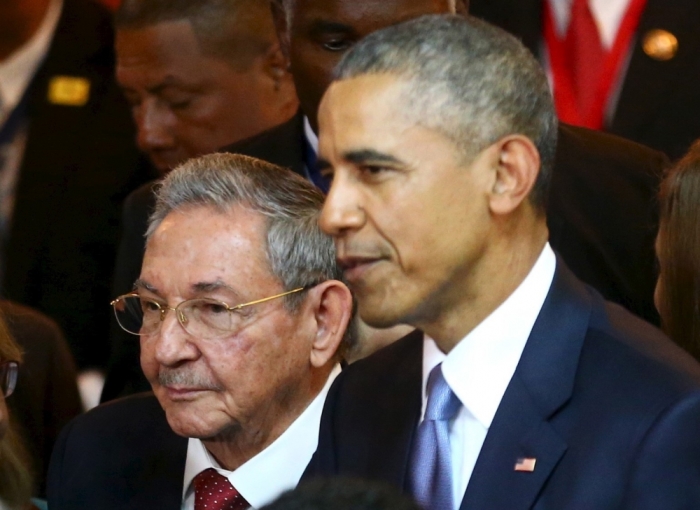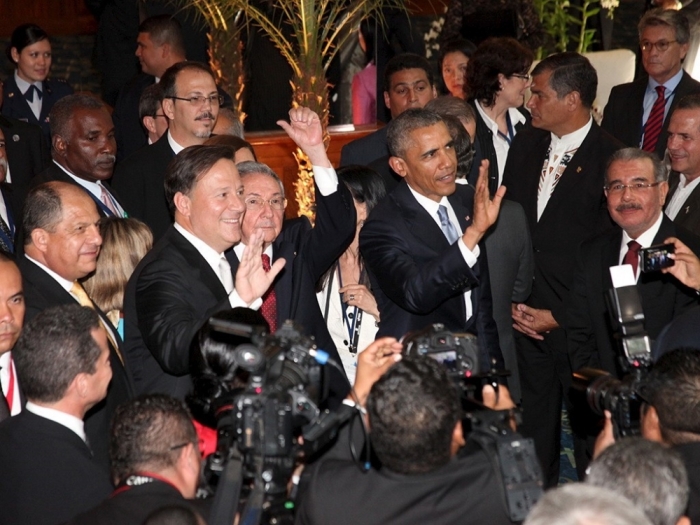Obama to Have Historic Meeting with Cuban President Castro

U.S. President Barack Obama and Cuban President Raul Castro are expected to have a face-to-face discussion on the sidelines of the Summit of the Americas in Panama Saturday, in an effort to restore diplomatic ties and set aside the two countries' Cold War enmity.
"As we move towards the process of normalization, we'll have our differences government to government with Cuba on many issues. Just as we differ at times with other nations within the Americas, just as we differ with our closest allies," Obama said Friday, according to Reuters.
"The days in which our agenda in this hemisphere so often presumed that the United States could meddle with impunity, those days are past," Obama added.
"We certainly anticipate that they will have a discussion tomorrow on the context of the summit," deputy national security adviser Ben Rhodes told reporters Friday.
The communist nation of Cuba, which had been blocked by the United States from participating in the past, has been included in the summit for the first time.
Obama and Castro talked by telephone about the two nations' relations earlier this week.

"I think they understood that this is obviously a very unique occurrence in the Americas—the first Summit of the Americas that Cuba's participated in," Rhodes said, according to NBC News.
"As the United States begins a new chapter in our relationship with Cuba, we hope it will create an environment that improves the lives of the Cuban people," Obama said Friday at a gathering of civil society groups, including Cuban dissidents, according to The Associated Press. "Not because it is imposed by us, the United States, but through the talent and ingenuity and aspirations, and the conversations among Cubans from all walks of life so they can decide what the best course is for their prosperity."
Obama and Castro had their last encounter at Nelson Mandela's memorial service, and they shook hands.
It is unclear if Cuba will be removed from the list of state sponsors of terror. If the Obama administration makes that move, Congress will have the power to issue a resolution of disapproval within 45 days. However, the margin of passage would have to be veto proof.
U.S. allies in the Americas are praising Obama for improving relations in the region.
"President Obama is going to leave a legacy the way he is supporting Hispanics in the United States, and also his new policy for Cuba for us is very important," Panamanian President Juan Carlos Varela was quoted as saying.
"We know we have challenges but that the United States is interested in making sure challenges are faced together," Guatemala President Otto Pérez Molina was quoted as saying.
The communist regime of Cuba showed some signs of economic and political reforms after Raul Castro's official election as President in 2008.
Cuba has been governed by a one-party state since Fidel Castro, the brother of Raul Castro, overthrew the U.S.-supported dictatorship of Fulgencio Batista in 1959. And the persecution of Christians and dissidents remains.
According to Open Doors USA, about 57 percent of Cubans are Christian and they face constant government surveillance and infiltration. However, the church is growing in the island country.
Last month, a shipment of 83,723 Spanish-language Bibles were sent to Cuba for a number of Southern Baptist churches in both Western and Eastern parts of the nation, according to SBC's International Mission Board.
Southern Baptists have sent nearly 500,000 Bibles to Cuba since 1999.
Last year, Cuba's government announced the approval of a permit for the building of a Catholic church building in Santiago de Cuba, the island's second largest city, for the first time in the nation since the 1959 Revolution.




























